This is a guest post in the BrightEdge Customer Column, a series of SEO best practices shared by thought-leaders among the BrightEdge customer community. This post describes how leading agency Relevance™ increased Rackspace traffic using BrightEdge's powerful competitive intelligence capabilities, and is written by Brad Smith, Inbound Marketing Consultant at Relevance™. Over the past year, Relevance has utilized the BrightEdge platform to help Rackspace execute a strategy that focuses on user experience. Fortunately, the BrightEdge platform allows any marketer to scale efforts from just a few to thousands of keywords. In the case of Rackspace, Relevance focused on improving natural search traffic for a great number of keywords. We used the associated keyword data to test, measure, optimize and refine specific campaigns related to Rackspace and achieve massive traffic gains.
How we use BrightEdge to win for Rackspace
Relevance uses the BrightEdge platform in many ways to inform each keyword campaign’s strategy. We have discovered that the BrightEdge platform allows us to not only monitor rankings, but also analyze what to do to create a better user experience. Here are seven powerful ways BrightEdge powered the Relevance/Rackspace strategy.
Rank tracking
Having a historical record of a keyword’s performance is helpful, but this is just the starting point. Understanding a keyword’s ranking is most helpful for competitor analysis.
Dashboard creation
Creating dashboards is helpful for snapshot reporting. It allows a marketer or marketing manager to see a quick snapshot of historical or competitive performance. Relevance also grouped keywords by related Rackspace product, created dashboards based on groups and set up each dashboard so that it can be emailed to the associated Rackspace product manager on a weekly basis.
Share of voice
BrightEdge reports up to the top 25 competitors for each search engine results page (SERP) based on keyword group. This allows Relevance and Rackspace to keep their fingers on the pulse of each competitor. The share of voice report also identifies what keyword(s) each competitor rank(s) for in that group.
Earned media overlap
BrightEdge identifies earned media opportunities for any tracked keyword. It also identifies which opportunities have multiple competitors. The key takeaway here is that if more than one competitor shows up on any particular opportunity, Rackspace may have a higher chance of also earning a placement on that same opportunity.
Keyword discovery
BrightEdge tracks keywords input into their system; they also identify competitor-targeted keywords that have not been entered into their system. Relevance utilizes this feature to help make suggestions for future keyword targeting campaigns.
Page-specific optimization
BrightEdge identifies all pages related to any targeted keyword. From there, BrightEdge creates natural search specific recommendations to optimize the on-page architecture for any page and associated keyword.
Competitive analysis
For any targeted keyword, BrightEdge will tell you the top 10 competitors in search for that keyword and will also identify each of the top 10 competitors’ on-page elements that impact search. This allows Relevance to supplement recommendations with related competitive analysis data.
Shifting focus to user experience
When it comes to natural search, rankings serve as a leading indicator to traffic. So, it’s no surprise that many mid- to high-level marketing managers focus solely on achieving higher rankings for each keyword they are targeting. In the end, however, rankings fluctuate from week to week and even day-to-day. Fluctuating rankings are one way for Google and other search engines to quickly determine if a Webmaster is attempting to game the search engine. For this reason, the focus to improve natural search traffic must be shifted from simply achieving rankings to creating a better user experience. But how does a marketing manager make that shift? The answer lies in understanding what Google and all other search engines pursue for their own platforms—and for their users. If a search engine continuously serves inadequate results to a user, that user could find another search engine that will provide him with the results that satisfies his search. Ultimately, each search engine must supply what the user demands: a better search experience.
Satisfying your users, not their search algorithms
When a marketer focuses only on rankings, the most common mistake made is catering the site only to search engines. The point of failure here is when the search engine ranks the marketer’s site higher in the search engines. Sure, the site begins receiving visitors, but the visitors can’t find what they are looking for and ultimately leave the site (bounce rate metric). Google and other search engines actually measure visitor satisfaction through on-page interactions. They can do this regardless of whether the marketers have the unique search engine analytics package installed by measuring on-page metrics.
When on-page metrics are low, Google and other search engines must lower the site’s rankings for related keywords to continue satisfying their user base. But when the focus is on user experience, the marketer innately caters to the user. The site’s on-page metrics may perform well and, because of this, search engines know they can satisfy their users’ search queries by sending visitors to the site whose on-page metrics perform consistently well. When user experience is the marketer’s focus, optimizing a site’s content and architecture each receive the appropriate amount of attention. From here, the marketer can utilize data—and yes, this means rankings—to make informed decisions that will help execute a well-planned marketing strategy. This post lists just seven of the powerful ways Relevance utilizes the BrightEdge platform to help Rackspace make informed decisions on creating a better user experience—and this in turn boosts natural search traffic to the Rackspace website.
Learn more about the Rackspace success story
To learn more about the results of the efforts, read the case study which includes the results or attend the Share13 session. Details listed below: Case Study: http://relevance.com/resources/case-studies/
Come see us at Share13
Relevance and Rackspace will be discussing this case study at BrightEdge Share13. Hope you can see us there.
Details are below: Time & Date - August 22 - 4:00-4:50 PM PST Track - Earned Media: Maximize your impact Session Title – Bringing it all together - Search and Earned Media Session Overview - Search, social, PR and blogs have the potential for driving significant business results collectively. Choosing where to allocate marketing dollars and attributing results can be a challenge.
Hear from digital marketers on the earned media mix that delivers the maximum return. Speakers David Whitworth, SEO Manager, Rackspace Marty Muse - Vice President, Client Solutions & Success, Relevance

